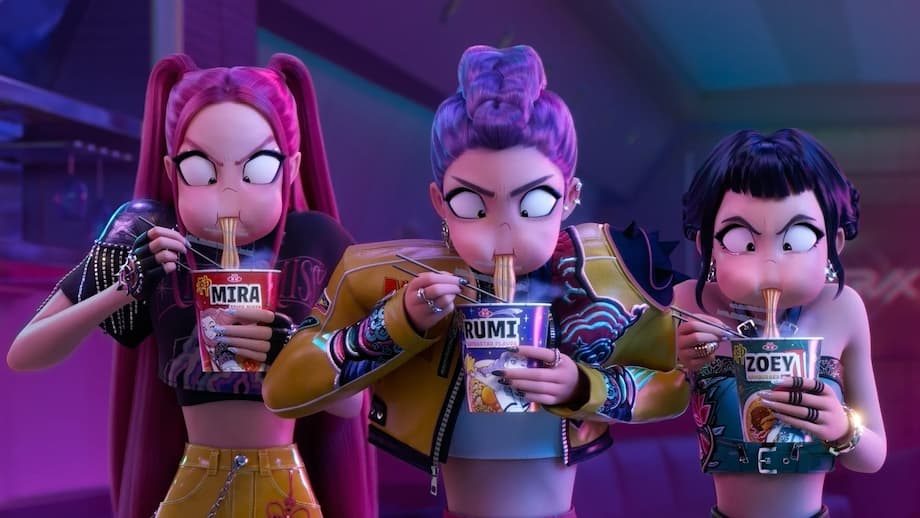The Animated Sensation That Took the World—and Sony—by Surprise
In the summer of 2025, a vibrant, genre-bending animated film about a K-pop girl group who moonlight as demon hunters exploded onto Netflix, captivating audiences worldwide. KPop Demon Hunters didn’t just break streaming records—it shattered them, becoming Netflix’s most-watched movie ever with a staggering 236 million views. Its soundtrack stormed the Billboard Hot 100, making music history with four simultaneous top 10 hits. Yet, behind this cultural phenomenon lies a cautionary tale for Hollywood: Sony Pictures Animation, the studio that spent $100 million to create the film, will see only a fraction of the spoils due to a pandemic-era distribution deal with Netflix. As the dust settles, industry insiders and fans alike are asking: How did Sony let a potential multibillion-dollar franchise slip through its fingers?
- The Animated Sensation That Took the World—and Sony—by Surprise
- How ‘KPop Demon Hunters’ Became a Netflix Juggernaut
- The Anatomy of a Missed Opportunity
- Inside the Netflix-Sony Deal: Who Owns What?
- The Cultural Impact: Why Audiences Can’t Get Enough
- Lessons for Hollywood: The Value of Intellectual Property
- In Summary
How ‘KPop Demon Hunters’ Became a Netflix Juggernaut
Directed by Maggie Kang and Chris Appelhans, KPop Demon Hunters is an American animated musical urban fantasy. The story follows Huntr/x, a K-pop girl group who secretly battle demons, drawing inspiration from Korean mythology, K-pop culture, and anime aesthetics. The film’s dazzling animation, infectious music, and universal themes of identity and self-acceptance resonated with viewers of all ages. Its cast includes Arden Cho, Ahn Hyo-seop, May Hong, Ji-young Yoo, Yunjin Kim, Daniel Dae Kim, Ken Jeong, and Lee Byung-hun, with original songs by Marcelo Zarvos and breakout K-pop stars EJAE and Andrew Choi.
Upon its Netflix debut on June 20, 2025, the film quickly surpassed Red Notice as the platform’s most-watched movie, holding the No. 1 spot for 10 consecutive weeks and appearing in the Top 10 in 93 countries. The soundtrack became a musical phenomenon, with the single “Golden” reaching No. 1 on the Billboard Hot 100—a feat not achieved by an animated film since Disney’s Encanto, and the first ever for a female-led animated soundtrack. The film’s cultural impact extended beyond streaming: a limited theatrical sing-along release sold out 975 showings, earning up to $20 million at the box office despite being available to stream at home.
Why Did Sony Sell the Rights?
The roots of Sony’s missed windfall trace back to 2021, when the entertainment industry was reeling from the COVID-19 pandemic. Theaters were shuttered, box office prospects for original animated films looked grim, and Sony lacked its own streaming platform. Seeking financial stability, Sony struck a multi-film deal with Netflix: the streamer would cover production costs and pay Sony an additional fee—capped at $20-25 million per film—in exchange for all distribution and merchandising rights. For Sony, it was a way to guarantee returns and avoid layoffs during an uncertain era.
At the time, the deal seemed prudent. Animated originals like Ruby Gillman, Teenage Kraken and Elio had floundered at the box office, and Netflix’s global reach offered a safety net. Few could have predicted that KPop Demon Hunters would become a once-in-a-generation hit, let alone a franchise rivaling Disney’s Frozen in potential.
The Anatomy of a Missed Opportunity
As KPop Demon Hunters soared, Sony’s capped profit—estimated at $20-25 million—began to look paltry compared to the film’s franchise potential. Netflix, meanwhile, now controls sequels, spinoffs, merchandise, and live experiences. The streamer is already planning a trilogy, a spinoff TV series, a stage musical, a short film, and even a live-action remake. Merchandise and soundtrack sales are expected to generate hundreds of millions more, all under Netflix’s umbrella.
Industry analysts have compared Sony’s situation to selling a winning lottery ticket for a modest sum. As Fortune noted, Netflix paid $465 million for Seinfeld reruns, making Sony’s $20 million payday for an original, record-breaking franchise seem almost tragic in hindsight. Sony executives have publicly acknowledged the need to develop and retain more original intellectual property, but for now, the company can only watch as Netflix reaps the rewards.
Could Sony Have Predicted the Film’s Success?
Some industry observers argue that Sony made the right call, given the risks. Original animated films—especially those with anime-inspired visuals and untested concepts—often struggle in theaters. Netflix’s algorithm and global platform allowed KPop Demon Hunters to find its audience organically, building momentum week after week. As Screen Rant points out, the film’s streaming-first release enabled it to become a word-of-mouth sensation, something that would have been difficult to replicate with a traditional theatrical rollout.
Still, the film’s surprise box office success during its sing-along event—pulling in $18-20 million in just two days—suggests that a full theatrical release could have been lucrative, especially with the global K-pop fanbase. The missed opportunity is now a case study in the risks and rewards of direct-to-streaming deals.
Inside the Netflix-Sony Deal: Who Owns What?
The 2021 agreement between Sony and Netflix was straightforward: Netflix would pay back the production budget and a capped fee, retaining all rights to the property and future profits. Sony would receive a share of soundtrack sales and music publishing fees, but merchandising and franchise rights belong solely to Netflix. As The Hollywood Reporter confirms, any sequels or spinoffs must be co-produced by both companies, but Netflix holds the distribution cards. If Netflix declines a sequel, Sony could shop it elsewhere, but sources say there is “zero chance” of a theatrical-first sequel under the current arrangement.
The deal’s structure reflects the pandemic’s uncertainty. Sony prioritized stability over potential upside, a decision that now looks costly. As Cartoon Brew and Epicstream report, Netflix’s strategy of acquiring undervalued content during industry crises has paid off handsomely, shifting power away from traditional studios.
Negotiating the Sequel: Who Holds the Leverage?
With KPop Demon Hunters now a proven franchise, Sony and Netflix are in early talks for a sequel. Directors Maggie Kang and Chris Appelhans are considered essential to any follow-up, but no deal is in place yet. Insiders say Netflix holds most of the leverage, and Sony’s profit on a sequel would likely be similarly capped unless the terms are renegotiated. The Hollywood Reporter notes that neither company can proceed with a sequel without the other’s involvement, but Netflix’s exclusive rights mean any new installment will almost certainly debut on the streaming platform.
The Cultural Impact: Why Audiences Can’t Get Enough
Beyond the business intrigue, KPop Demon Hunters has become a genuine cultural phenomenon. The film’s blend of K-pop, Korean mythology, and supernatural adventure has resonated with a diverse global audience. Children are drawn to its action and animation, while adults connect with deeper themes of community, friendship, and self-acceptance. The film’s protagonist, Rumi, embarks on a journey of embracing her true self, a narrative that has struck a chord with viewers navigating their own identities.
The soundtrack’s success is unprecedented: four songs in the Billboard Hot 100’s top 10, with “Golden” at No. 1, and seven tracks in Spotify’s global Top 50. The film’s musical stars, previously unknown in the K-pop industry, have become overnight sensations. Social media is awash with fan art, dance covers, and cosplay, while sold-out sing-along screenings have turned moviegoing into a communal celebration.
Critics have praised the film’s authentic Korean representation, innovative animation, and emotionally rich storytelling. As The Guardian observes, KPop Demon Hunters has inspired both kids and parents, proving that original stories can still break through in a crowded media landscape.
Lessons for Hollywood: The Value of Intellectual Property
The saga of KPop Demon Hunters underscores a fundamental truth in today’s entertainment industry: owning a hit is far more valuable than just creating one. Netflix’s control over the franchise means it will profit from sequels, merchandise, live events, and more for years to come. Sony, despite its creative investment, is left with a modest payout and limited involvement in future projects.
Industry experts say the case will likely influence how studios approach streaming deals in the future. As WebProNews and Puck report, studios may seek better terms, including profit participation and retention of key rights, especially for projects with franchise potential. The shifting power dynamics between traditional studios and streaming giants are reshaping Hollywood’s business models, with intellectual property at the center of the battle.
In Summary
- KPop Demon Hunters became Netflix’s most-watched film ever, with 236 million views and record-breaking soundtrack success.
- Sony Pictures Animation produced the film for $100 million but will net only $20-25 million due to a pandemic-era deal with Netflix.
- Netflix now controls all rights to the franchise, including sequels, merchandise, and live events, positioning it for multibillion-dollar returns.
- The film’s surprise box office and cultural impact highlight the risks and rewards of direct-to-streaming deals for traditional studios.
- Negotiations for a sequel are underway, but Netflix holds most of the leverage under the current agreement.
- The story serves as a lesson for Hollywood on the enduring value of intellectual property ownership in the streaming era.












